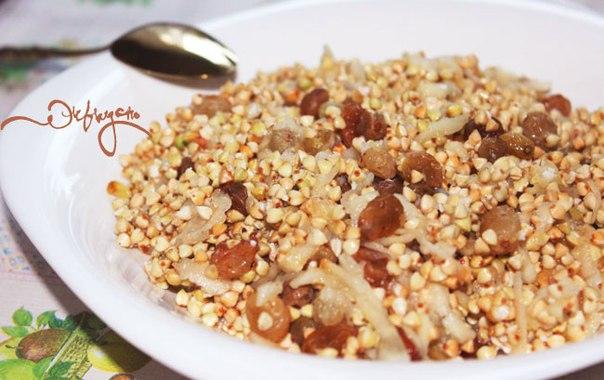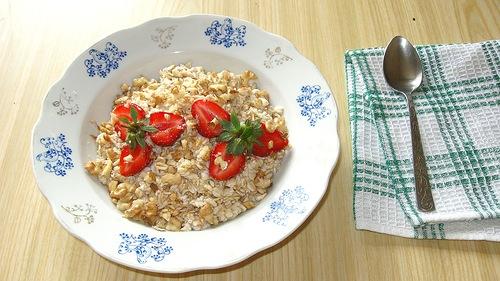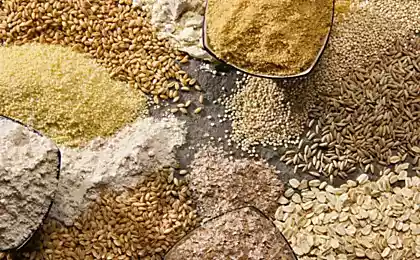755
LIVING PAP - without cooking!

When I lived in a city apartment and thought about life on the estate, looking for an alternative to the city's benefits, I was visited by a question - how to cook the usual porridge (buckwheat, wheat, oat, barley, etc.), while not using fire or electricity, ie do without cooking?
Immediately I remembered how my aunt filled with water the beans and leave it in this form, at night, in the morning to quickly cook soup (per night beans swelled, so that it does not need to cook for a long time). I had an idea to do the same with cereals. What was my surprise when soaked buckwheat in this way was completely ready for use, while it did not need to cook!
I must say that the taste of it I do not really like (I usually add salt to the porridge and butter), but that was the reason - the habit. Crossing a little later on a raw food diet and giving up salt and sugar, I appreciated the excellence of such cereals as became vividly feel the taste of each product. Eating the same buckwheat porridge with salt and butter, we mostly feel the taste of the past, not the buckwheat.
After experimenting with different herbs soak, I made the time table, the minimum necessary to prepare a specific cereal:
NAME OF CEREALS MINIMUM TIME SOAK
(In cold water)
Buckwheat 1:00
Wheat 30 hours
Rye 12:00
Oats 4:00
Barley
2 hours Figure 70 hours
Rye, oats, wheat flakes 5-10 minutes
As can be seen from the plate, rice - the trudnozamachivaemy. One pleases - it we do not grow. Interestingly, the soaked rice brushing his teeth (removing plaque), and boiled - contaminate them (forms plaque)
. I want to stay on a little buckwheat. That buckwheat that you buy in the store (brown), is fried! Conventional buckwheat seeds removed the outer (black) shell mechanical method, then purified buckwheat has a greenish color and the taste has nothing to do with shopping. Now imagine - you buy fried buckwheat, and then cook it (and, most likely, more than once, because by the time it is also a warm up), as a result you eat twice killed buckwheat
! Soaked grains remain alive (they can germinate), they will give you all the nutrients without loss, and cooked it can not boast - the heat treatment kills them, and significantly reduces the content of nutrients
. The above label is valid only when the air temperature is not below + 1 ° C, because in natural winter conditions at the time of soaking water just freezes - this is another reason to think about regarding the food at the estate, whether to eat cereals in the winter should be ... But that's another story
. Nevidomy Alexander
Choose your porridge!
BUCKWHEAT: rich in iron and calcium, B vitamins, contains a lot of easily digestible proteins (so in China it is considered an equivalent substitute for meat). Useful for the prevention of cardiovascular disease, it helps with hypertension, liver disease, edema. It normalizes digestion and bowel function. In addition, buckwheat contains 8% of quercetin, which is considered one of the most powerful natural substances for the prevention and treatment of cancer.
Calories:. 329 kcal / 100 g
CORN: promotes intestinal rehabilitation, it contains silicon, which has a positive effect on dental health. Another plus is that the low-calorie obtained from corn porridge, which is also able to remove fat from the body.
Calories:. 325 kcal / 100 g
Semolina: contrary to popular stereotype, is not the most useful porridge. Firstly, highly allergenic comprises vegetable protein gluten, secondly, calcium leaches out of the body. On the other hand, it is recommended for all suffering from stomach diseases.
Calories:. 326 kcal / 100 g

Oatmeal: quite caloric, gives "wraparound" effect. It is useful in diseases of the gastrointestinal tract (gastritis, gastric ulcer, etc.)
Calories:. 345 kcal / 100 g
Barley: normalizes metabolism (for example, in the initial stages of obesity), rich in trace elements, vitamins Group B. Good helps with allergies, it is recommended for the prevention of anemia
. Calories:. 324 kcal / 100 g
Millet: displays the body of excess mineral salts, it binds and removes fat from the body. Millet is rich in vitamin A, which helps to retain moisture in the skin and promotes its regeneration. Furthermore, porridge contains calcium and magnesium salts, which are necessary for the normal operation of the heart and blood vessels. Poor one - millet is stored for long (an indicator of freshness - deep yellow color). If the dealer turned pale, then lost the vast majority of its beneficial properties.
Calories:. 334 kcal / 100 g
RICE: The most low-calorie cereal. It contains a lot of vegetable protein and starch, is easily digested.
Calories: 323 kcal / 100 g.
Syroedchesky vegetable soup "diet"
SYROEDCHESKY cake with gentle lemon-mint CREAM WITHOUT flour and sugar
























